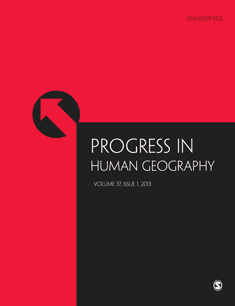
PROGRESS IN HUMAN GEOGRAPHY
Scope & Guideline
Advancing the Frontiers of Human Geography
Introduction
Aims and Scopes
- Interdisciplinary Approaches to Geography:
The journal emphasizes the integration of diverse methodologies and theoretical perspectives, encouraging submissions that draw from sociology, political science, economics, and cultural studies to enrich geographical research. - Focus on Social Justice and Equity:
There is a strong commitment to exploring themes of social justice, inequality, and the impacts of globalization, particularly how these factors affect marginalized communities and populations. - Critical Examination of Space and Place:
Papers often delve into the politics of space and place, examining how geographical contexts shape social relations, identities, and power dynamics. - Engagement with Contemporary Global Issues:
The journal is particularly interested in research that addresses pressing global challenges such as climate change, migration, urbanization, and technological transformation, reflecting on their geographical implications. - Innovative Methodologies:
A notable aspect of the journal is its encouragement of novel research methodologies, including qualitative, quantitative, and mixed methods approaches, to address complex geographical questions. - Decolonial and Intersectional Perspectives:
The journal promotes decolonial approaches and intersectional analyses that interrogate traditional geographical narratives, seeking to broaden the scope of human geography by incorporating diverse voices and experiences.
Trending and Emerging
- Geographies of Migration and Mobility:
An increasing focus on migration studies, particularly in relation to digital migration, forced migration, and the experiences of marginalized groups, indicates a growing recognition of the complexities of mobility in a globalized world. - Digital Geographies and Technology:
The rise of digital geographies, including the study of GIS, big data, and the implications of digital technologies on space and social relations, showcases the journal's alignment with technological advancements and their geographical impacts. - Political Ecology and Environmental Justice:
There is a marked trend towards integrating political ecology with discussions of environmental justice, emphasizing the relationships between social inequalities and ecological crises. - Health Geographies and Precarity:
Emerging themes in health geography, particularly those addressing the spatial dimensions of health inequalities and the impacts of crises (like the COVID-19 pandemic), are increasingly prevalent. - Decolonial and Anti-Racist Geographies:
A significant trend is the growing emphasis on decolonial and anti-racist perspectives in geographical research, reflecting broader societal movements and the need to challenge established narratives. - Intersectionality in Geographical Research:
There is a burgeoning interest in intersectional analyses that consider the interplay of various social identities and their impacts on geographical experiences and representations.
Declining or Waning
- Traditional Economic Geography:
The focus on conventional economic geography themes, such as industrial location theory and classical economic models, has diminished. The journal has shifted towards more contemporary issues like financialization and the gig economy. - Static Approaches to Urban Studies:
Research that employs static models to analyze urban environments has seen a decline. There is a growing preference for dynamic, process-oriented studies that consider the fluidity of urbanization and the complexities of urban life. - Geographies of Physical Environment:
Themes centered around the physical aspects of geography, such as landforms and natural features, have become less prominent. The journal’s focus has increasingly turned towards socio-political and cultural dimensions of geography. - Homogeneous Cultural Studies:
The exploration of culture in a monolithic manner is waning. Instead, there is a growing emphasis on intersectionality and the diverse cultural experiences shaped by race, gender, and socio-economic status. - Quantitative Methods without Contextualization:
There has been a noticeable decline in papers that apply quantitative methods without adequate contextualization. The journal increasingly values qualitative insights that provide depth to numerical data.
Similar Journals

Southeastern Geographer
Championing Diverse Perspectives in Geographical ResearchThe Southeastern Geographer is a prominent academic journal published by the Association of American Geographers, dedicated to advancing knowledge in the fields of Earth and Planetary Sciences and Geography, Planning and Development. With an ISSN of 0038-366X and an E-ISSN of 1549-6929, this journal has been a staple in geographical scholarship since its inception, offering a platform for diverse research that spans over four decades, specifically from 1979 to 1994 and then from 1996 to 2024. The journal is currently classified in the Q3 category within its fields, indicating its significant influence in shaping contemporary geographical discourse. Researchers, professionals, and students alike benefit from its rigorously peer-reviewed articles that explore regional studies, environmental issues, and sociocultural dynamics, making it essential for anyone interested in the interconnectedness of geography and society. As a vital resource for advancing geographical education and research, the Southeastern Geographer continues to engage its audience with innovative insights and scholarly contributions.
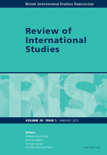
REVIEW OF INTERNATIONAL STUDIES
Advancing global discourse in political science.REVIEW OF INTERNATIONAL STUDIES, published by Cambridge University Press, is a leading journal in the fields of Political Science and International Relations, with a robust focus on sociopolitical dynamics from a global perspective. Established in 1976, it has garnered a distinguished reputation, achieving a Q1 ranking in both Political Science and Sociology for 2023, underscoring its impact and relevance within the scholarly community. With an impressive Scopus ranking placing it in the 93rd percentile among peer journals in its field, this journal serves as an essential platform for researchers, professionals, and students engaged in critical analysis and discourse on international affairs. Although it does not currently offer Open Access options, the journal is committed to advancing knowledge through rigorous peer-reviewed research, contributing significantly to the academic dialogue surrounding global political issues.
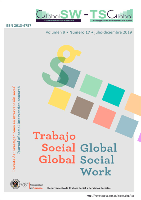
Trabajo Social Global-Global Social Work
Empowering social change through innovative research.Trabajo Social Global-Global Social Work is a premier open-access journal published by the University of Granada's Department of Social Work, dedicated to advancing the fields of social work and social welfare on a global scale. With its ISSN 2013-6757 and E-ISSN 2013-6757, this journal has been making significant contributions since its establishment in 2010, emphasizing the importance of accessible research for practitioners, scholars, and students alike. Situated in Granada, Spain, the journal provides a platform for innovative research, critical analyses, and contemporary discussions on global social work practices, policies, and theories. By encouraging collaboration and knowledge exchange among professionals from diverse backgrounds, Trabajo Social Global plays a vital role in shaping social work education and practice around the world. Researchers and practitioners are urged to submit their work to this influential journal, as it continues to foster a deeper understanding of the challenges and opportunities in the field of social work today.

PACIFIC AFFAIRS
Charting New Territories in Sociology and GeographyPACIFIC AFFAIRS is a distinguished journal published by the University of British Columbia, specializing in the fields of Sociology, Political Science, and Geography. With a history dating back to its converged years starting in 1979, this journal has established itself as a crucial platform for scholarly discourse on societal and geopolitical issues within the Pacific region and beyond. Although it is not an open-access journal, it provides valuable insights and research findings that contribute rigorously to its respective fields, holding a respectable Q3 ranking in Geography, Planning and Development and a Q2 ranking in Sociology and Political Science as of 2023. Currently, it holds a Scopus rank of 620 out of 1466 in Sociology and Political Science, reflecting its significance in academic research. PACIFIC AFFAIRS continues to inspire researchers, professionals, and students alike to engage with pressing topics relevant to the Pacific area, providing a platform for innovative research and critical analysis.

Global Discourse
Fostering Interdisciplinary Dialogue for a Global FutureGlobal Discourse is a preeminent journal in the fields of Political Science, International Relations, and Sociology, published by BRISTOL UNIVERSITY PRESS & POLICY PRESS. With an ISSN of 2326-9995 and an E-ISSN of 2043-7897, this journal provides scholarly insights that bridge theoretical frameworks and practical implications in global social dynamics. Operating as an open-access publication, Global Discourse is dedicated to advancing the understanding of contemporary societal challenges through rigorous analysis and interdisciplinary approaches. Its impressive rankings, including Q2 status in 2023 for both Political Science and International Relations and Sociology, reflect its vital role within the academic community—positioning it within the top 15% and 19% of its respective fields. Researchers, practitioners, and students alike are encouraged to contribute to and benefit from the journal's rich repository of knowledge, fostering dialogue that shapes the future of global discourse.
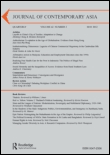
JOURNAL OF CONTEMPORARY ASIA
Unveiling the Cultural Tapestry of Modern AsiaThe Journal of Contemporary Asia, published by Routledge Journals, Taylor & Francis Ltd, is an esteemed academic platform that explores pivotal issues and developments within the fields of Cultural Studies and Social Sciences. With an impressive impact factor signified by its Q1 category rankings in both domains and its remarkable positions of Rank #38 in Cultural Studies and Rank #59 in Social Sciences (miscellaneous) as per Scopus, this journal has emerged as a leading source of interdisciplinary research since its inception in 1970. Spanning relevant topics in contemporary Asian studies, it serves as an essential resource for researchers, professionals, and students aiming to deepen their understanding of the socio-cultural dynamics of the region. While currently offering subscription-based access options, its invaluable insights contribute significantly to advancing scholarship and informed discourse in contemporary Asian studies.

Documents d Analisi Geografica
Illuminating Contemporary Geographical Challenges and SolutionsDocuments d'Anàlisi Geogràfica is a distinguished academic journal published by Universitat Autònoma de Barcelona, focusing on the fields of geography, planning, and earth-surface processes since its inception in 1988. With an Open Access policy implemented in 2012, the journal aims to facilitate the widespread dissemination of geographical research and insights, accessible to a global audience. Currently ranked in Q3 for both Earth-Surface Processes and Geography, Planning and Development categories, it serves as a vital platform for researchers, practitioners, and students to share their findings and enhance knowledge in these critical fields. The journal is indexed in Scopus, where it stands at rank #470 in Social Sciences and #106 in Earth and Planetary Sciences, reflecting its growing impact in relevant academic communities. Based in Barcelona, Spain, Documents d'Anàlisi Geogràfica continues to contribute substantially to geographical scholarship by exploring contemporary issues and advancements in a rapidly evolving world.
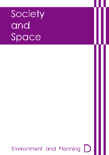
ENVIRONMENT AND PLANNING D-SOCIETY & SPACE
Shaping the future of urban sustainability through critical analysis.Environment and Planning D: Society & Space is a prestigious journal published by SAGE Publications Ltd, focusing on the interdisciplinary intersection of environmental studies, urban planning, and social sciences. Since its inception in 1983, this journal has become a leading platform for groundbreaking research, evident by its distinguished Q1 rankings in both Environmental Science and Geography, Planning and Development categories. With an impressive Scopus rank placing it in the top 10% of related fields, it provides an invaluable resource for researchers, policymakers, and practitioners alike. The journal features high-quality articles that delve into contemporary issues like climate change, urban sustainability, and spatial dynamics, fostering a critical understanding of the socio-environmental challenges of our time. Although currently not offering open access, Environment and Planning D remains committed to advancing knowledge and inspiring innovative solutions for a sustainable future, drawing contributions from experts around the globe.
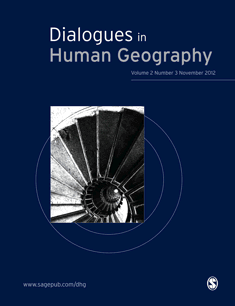
Dialogues in Human Geography
Innovating Perspectives on People and PlaceDialogues in Human Geography is a leading journal published by SAGE Publications Ltd, specializing in the dynamic and evolving field of human geography. With an ISSN of 2043-8206 and an E-ISSN of 2043-8214, this esteemed journal is notable for its Q1 ranking in the Geography, Planning and Development category, placing it in the top tier of social science publications. As of 2023, it boasts an impressive Scopus rank of 73 out of 821, positioning it within the 91st percentile, illustrating its significance and influence in academic discourse. Since its inception in 2011, the journal has aimed to foster critical exchanges and innovative perspectives on complex spatial and social issues. Researchers, professionals, and students alike will find engaging and thought-provoking contributions that challenge traditional notions within the field, making it an essential resource for anyone invested in understanding the intricate relationships between people and their environments.
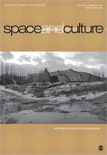
Space and Culture
Navigating the Complexities of Culture and GeographySpace and Culture is a distinguished peer-reviewed journal published by SAGE Publications Inc. This journal, with an ISSN of 1206-3312 and E-ISSN of 1552-8308, has established itself as a prominent platform for interdisciplinary scholarship in the realms of Arts and Humanities, Cultural Studies, Geography, and Urban Studies. With a remarkable reputation reflected in its recent Scopus rankings, including Q1 status in multiple categories, it appeals to researchers and professionals interested in examining the complex interrelations of space, culture, and society. Covering a diverse range of themes from urban studies to tourism, the journal aims to foster innovative conversations and critical thinking. Its commitment to academic excellence ensures that contributors can engage with a global audience, making it an invaluable resource for students and scholars alike.